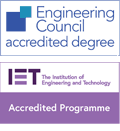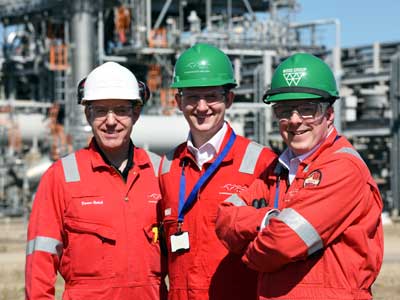Course overview
Accredited Foundation year Integrated masters Work placement
Study electrical and electronic engineering at Teesside University
Find out what makes studying electrical and electronic engineering at Teesside University different.
You gain an understanding and knowledge of electrical and electronic engineering subjects including analogue and digital electronics, microprocessors, embedded systems, design, modelling, coding, communication systems, electrical machines and power systems.
Life without electronics seems unimaginable – you develop the technical and practical skills to be a highly sought after engineer playing a key role in modern society.
Top reasons to study electrical and electronic engineering at Teesside
- Financial awards: you may be eligible for a number of scholarships and awards.
- Prepare for your studies: develop your understanding in maths with our free online Mathematics for University course.
- International visits: you have opportunities to travel internationally through student mobility visits or spending a semester studying abroad with one of our partners in countries such as China, the Czech Republic, Spain and Malaysia.
- Student satisfaction: 90% of electrical and electronic engineering students agreed that it was easy to contact teaching staff if they needed to (National Student Survey 2024, tees.ac.uk/source).
Course details
Course structure
Year 1 core modules
This module gives you a basic understanding of the physical fundamentals used in electrical engineering, together with specific techniques you need to determine the behaviour of electric circuits.
We cover the fundamentals of electrical circuit theory, analysis of electrical circuits, give you an understanding of simple analogue and digital circuits and an appreciation of their application to engineering problems.
We look at voltage, current, power, energy, resistance and impedance. Also magnetic fields and inductance, electric fields and capacitance, Kirchhoff’s Laws. We examine time varying voltages and currents, effects on inductors and capacitors, sinusoidal voltage and current use of symbolic notation.
You also study power, reactive power and apparent power, circuit analysis techniques, mesh and nodal analysis, transistors and properties of amplifiers.
Our primary method of teaching is lectures supported by laboratory sessions, tutorials, problem solving and directed learning.
You learn how to:
- understand and use key elements of electrical and electronic theory
- apply given tools in the solution of well defined electrical and electronic engineering problems
- apply numerical skills to simple electrical and electronic engineering problems
- use basic IT tools and specialist software to solve simple electrical and electronic engineering problems.
You develop an understanding of digital and analogue electronics. And focus on important components, operations and circuits. You explore theoretical principles and conduct laboratory exercises using expert equipment.
This is a 20-credit module.
This module introduces the range of mathematical skills that are relevant to an engineering degree. You revisit and develop your knowledge of the fundamentals of algebra, trigonometry and basic statistics. The central ideas of vectors, matrices, complex numbers, and differential and integral calculus are also examined.
Throughout the module you develop a range of mathematical skills and techniques fundamental to the solution of engineering problems. You also advance your skills in selecting and applying mathematical techniques.
This module is delivered through a combination of lectures and tutorial sessions.
You develop and enhance the practical, professional and electrical engineering skills necessary for success in both the academic and work environment. There is a significant practical element which enables you to develop your knowledge, confidence and the fundamental principles of electrical engineering design methods and laboratory practice. You are also introduced to the skills required to improve opportunities in career selection and development through exposure to a range of on-campus services and external professional bodies.
The practical sessions include: health and safety, equipment selection, component selection, circuit construction, measuring instruments, testing and fault diagnosis.
This module provides you with an introduction to instrumentation, through studying the principles and characteristics of measurement systems and elements, and their underlying physical principles.
On successful completion of this module, you will be able to:
- gather record, describe and evaluate sensor and system data from a variety of sources
- demonstrate practical ability in carrying out experimental physical measurements, within defined contexts in areas relevant to physics and instrumentation
- present written evidence to demonstrate understanding of experimental investigation of underlying physical principles of measurement sensors and systems.
You will be assessed on an exam, system design exercise and laboratory report.
You focus on the implementation of systems for both programmable logic controllers (PLCs) and embedded systems. PLCs are used to explain theory, to discuss applications and to cover practical aspects of programmable logic controllers and lead to the design of a control system for an industrial process. Embedded systems are explained by using their industrial applications and practical programming applications using a microcontroller-based system. You work in teams to solve an industrially-relevant real-time embedded system application.
Year 2 core modules
In this group project module you work in teams to solve an industrially relevant digital electronics design problem. Through your project work you develop employability skills such as project management, work presentation, research and commercial awareness. You become more adept at technical problem solving.
You investigate digital electronics and are introduced to digital electronics design techniques, and their application to real problems.
This module introduces electrical power systems, including balanced/unbalanced three-phase systems, transformers, and transmission lines.
Practical sessions involve the use of laboratory setups and software packages (Pspice & Matlab) for the analysis of power system component characteristics. Tutorials will involve guided exercises and practical tasks incorporating examples of current industry practice.
The module encompasses the theoretical and practical aspects of modern digital and industrial communications systems and protocols. The module provides the principles of the design, analysis and practical implementation and industrial use of digital, serial, wired and wireless communication systems. The module also introduces practical industrial communication protocols and information management systems.
Integral Transforms and Matrices
You deepen your mathematical knowledge in key areas to use in a number of techniques to solve problems that arise in engineering domains. You develop competence in identifying the most appropriate method to solve a problem and its application.
You are introduced to the techniques and principles, and you are provided with problems that develop your competency in applying these techniques. You are shown how to implement numerical methods using software techniques.
This module teaches principles and analysis of electrical machines. Machine performance and operation characteristics are investigated in-depth in both analytical and experimental methods. Students will develop analytical techniques for predicting device and system interaction characteristics as well as applications. Laboratory setups and software packages such as (Pspice & Matlab) will be used to model and analyse a typical machine performance and characteristics.
Problems used in the course are intended to strengthen understanding of the phenomena and interactions of electrical machine, and include examples from current research and industry practice.
Multidisciplinary Software and Systems
This module introduces C++ programming with an emphasis on the learning, development and application of algorithms and data structures within an engineering context. The students will be introduced to the basics of class-based object-oriented programming using the C++ language.
Students will be required to demonstrate conceptual understanding and practical competence of programming by designing and implementing solutions to specific programming problems.
The module is taught with lectures, labs and related practical work. Lectures will provide an explanation of theory and demonstrations of programming examples. Lab sessions will provide you an opportunity to develop programming skills through the use of practice exercises.
The module is assessed by a report midway through the course and a group programming task at the end of the module period.
Optional work placement year
You have the option to spend one year in industry learning and developing your skills. We encourage and support you with applying for a placement, job hunting and networking.
You gain experience favoured by graduate recruiters and develop your technical skillset. You also obtain the transferable skills required in any professional environment, including communication, negotiation, teamwork, leadership, organisation, confidence, self-reliance, problem-solving, being able to work under pressure, and commercial awareness.
Many employers view a placement as a year-long interview, therefore placements are increasingly becoming an essential part of an organisation's pre-selection strategy in their graduate recruitment process. Benefits include:
· improved job prospects
· enhanced employment skills and improved career progression opportunities
· a higher starting salary than your full-time counterparts
· a better degree classification
· a richer CV
· a year's salary before completing your degree
· experience of workplace culture
· the opportunity to design and base your final-year project within a working environment.
If you are unable to secure a work placement with an employer, then you simply continue on a course without the work placement.
Final-year core modules
This module aims to provide students with the capability to analyse and design power electronic converters and to integrate them in DC and AC electric drive systems. The module is delivered through a combination of lectures, guided reading, laboratory sessions and tutorials. Demonstrations using modern experimental facilities will give the students the opportunity to explore converters’ operation in full and to gain a deep understanding of practical design constraints.
Problems used in the module are intended to strengthen understanding of the phenomena and interactions of electric drives, and include examples from current research and industry practice.
This module introduces you to the fundamental of industrial electronics including power electronic devices, power electronic converters and their application to switched mode power supply and other power electronic applications. The module also considers the principles of modelling, analysis and design of industrial electronics circuits such as switch mode power supply.
The module will be delivered through a combination of lectures and practical sessions. Lectures will provide an explanation of principles and discussion of industrial electronics applications. Extensive use of appropriate software tools (such as MATLAB, PSpice) in the practical sessions will give you the opportunity to explore these principles in greater depth. The practical sessions will be used to design and analyses of the electronic circuits.
This module presents methods of power system analysis to give a sound understanding of a broad range of topics related to power system engineering. It includes studies on operation, design and economics of power generation, transmission/distribution systems. Frequency and voltage control, and protection schemes are covered for both normal and fault conditions.
The module is taught with lectures, for explanation of principles and discussion of applications, and seminars for guided exercises There are also a series of practical's utilising industry standard software for the analysis of power flow and fault levels which will incorporate examples of current industry practice.
This is a 20-credit module.
This module extends the development of independent learning skills by allowing you to investigate an area of engineering or technology for an extended period.
You receive training in writing technical reports for knowledgeable readers and you produce a report or dissertation of the work covered. In addition, you give an oral presentation, a poster presentation or both. The topic can be in the form of a research project or a design project.
You develop key skills in research, knowledge application and creation through keynote lectures where appropriate and self-managed independent study. Support is provided through regular tutorial sessions.
Sustainable Systems and Industry 4.0
The emergence of Industry 4.0, often referred to as the fourth industrial revolution, has been attributed to advancing automation, decentralisation and system integration and cloud computing. In the cyber-physical environment, machines can communicate, collect information, and make informed decisions through artificial intelligence (AI), big data and industrial internet of things (IIoT). The evolution of Industry 4.0 has great potential to improve the energy, equipment, and human behaviour. At the same time, in the era of the so-called circular economy, industry across all sectors is under huge pressure to make their manufacturing operations ethical and sustainable. Therefore, we must learn to adopt or implement the latest Industry 4.0 technologies.
The term sustainability has a multi-disciplinary use and meaning. As future engineers you will learn sustainability is represented as the synergy between environment, economics, and society. In this module students specialising in Sustainable Systems and Industry 4.0 will focus their studies and deepen their knowledge in a range of sustainability themes such as energy management and power systems, sustainable water and wastewater systems, sustainable transportation technologies, transitions to sustainable food systems and mechanical manufacturing systems.
The subjects will be taught through a combination of lectures and seminars. Lectures will develop key concepts and knowledge. Seminars will allow more focused examinations of important issues and approaches
Modules offered may vary.
How you learn
You learn through lectures, seminars and hands-on lab sessions. You are also expected to undertake self-guided study time to review lecture notes, prepare coursework assignments, work on projects and revise for assessments.
How you are assessed
You are assessed through coursework assignments, project reports and formal exams.
Our Disability Services team provide an inclusive and empowering learning environment and have specialist staff to support disabled students access any additional tailored resources needed. If you have a specific learning difficulty, mental health condition, autism, sensory impairment, chronic health condition or any other disability please contact a Disability Services as early as possible.
Find out more about our disability services
Find out more about financial support
Find out more about our course related costs
Entry requirements
Entry requirements
96-112 points including maths, from any combination of acceptable Level 3 qualifications. Examples include A-level, BTEC, Access to HE Diplomas, Scottish and Irish Highers, T-Level, or the International Baccalaureate.
We accept the following T-Levels:
- Design and Development for Engineering and Manufacturing
- Design, Surveying and Planning for Construction (specialism Civil Engineering)
- Maintenance, Installation and Repair for Engineering and Manufacturing from City & Guilds.
Find out how many points your qualifications are worth using the UCAS tariff calculator.
Accredited prior learning
You may be able to join onto year two or three if you’ve studied a HNC or HND. If you don’t have a qualification but have gained relevant credits at Level 4 in a related subject, then credit transfer may be possible.
Alternative routes into this course are available if you have not met the entry requirements as listed.
International students who need a student visa to study in the UK should check our international web pages on acceptable international qualifications and UKVI-compliant English language requirements.
For general information please see our overview of entry requirements.
International applicants can find out what qualifications they need by visiting Your Country.
You can gain considerable knowledge from work, volunteering and life. Under recognition of prior learning (RPL) you may be awarded credit for this which can be credited towards the course you want to study.
Find out more about RPL
Employability
Career opportunities
Skilled electrical and electronic engineers are in high demand and can find employment in almost every sector of modern industry including energy, manufacturing, transport, communications, electronics, and health industries.
Our graduates are employed by companies such as PD Ports, ConocoPhilips, Polyphotonics, EDF Energy, Mott McDonald, WSP, Northern Powergrid, MBDA, Hitachi, GSK, and many others.
Our Student Futures careers and employability team can help you map out your future career.
Working as an electrical engineer.
Working as an electronics engineer.
Information for international applicants
Qualifications
International applicants - find out what qualifications you need by selecting your country below.
Select your country:
Useful information
Visit our international pages for useful information for non-UK students and applicants.










 BEng (Hons) Electrical and Electronic Engineering
BEng (Hons) Electrical and Electronic Engineering
